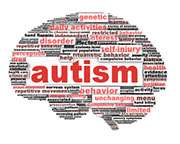They may find it difficult to make friends or keep a job, she says.
(HealthDay)—Judy Blake knows all too well the difficulties that children with autism face when transitioning to adulthood. That's because she has two sons with autism spectrum disorders who are now legally considered adults.
Her oldest son is 21 and in his third year of college. Her younger son, who's 18, will probably go to community college after high school, but right now she's just not sure. He has more difficulties stemming from his autism.
"Autism affects so many parts of your life—social, educational and in the workplace," Blake said. "With early intervention, you hope you've given them the compensatory skills they'll need, and then you just pray."
Blake said her oldest son is considered to be high-functioning on the autism spectrum disorder. "He's brilliant, very bright, but at times he has difficulty with social skills," she said.
Academic prowess doesn't come as easily to her younger son, and she said that, when it comes to maturity, he's probably more like a 12- or 13-year-old right now. "He doesn't drive, and I don't anticipate him driving," Blake said. "He's very trusting, and he isn't capable of making his own decisions. I don't see him living on his own. He's too introverted."
Her hope is that in 10 years or so he'll be able to move into a group home with other autistic adults that has staff to monitor and help the residents. One such home that she's aware of is reasonably priced, offers help finding jobs and provides transportation to and from work.
Most residential living facilities for adults with autism aren't affordable, she said, and "often cost a fortune"—sometimes more than $50,000 a year. As a single mother, that's simply not something she can even consider, and she suspects it's out of reach for most families.
"There are just never enough resources," Blake said. "I think that may be because these conditions are invisible as they transition into adulthood. I think society is more accepting when they can see the special need. When we can't see something, we tend to speak before we think, and judge before we know. If my children had a condition like Down syndrome, in my opinion, I think more services would be available."
Blake said she's also noticed that people were more accepting when her children were young.
"As they transition into adulthood, kids with autism are perceived as weird, and they may find it difficult to make friends or keep a job," she said.
In addition to a lack of resources for daily living and education, Blake worries that her sons, especially her younger son, might be taken advantage of. She also gives talks at police departments to help police officers understand how a person with autism might behave when stopped by the police.
"If the police pull over someone who won't look them in the eyes, they assume that person is up to something," she explained.
Parents of children with an autism spectrum disorder need to "keep an open mind," Blake said. "What's going to work for one adult with special needs might not work for the next. Some may need a group home. Some may live in an apartment, but can't drive. There are no cookie-cutter solutions."
She also pointed out that the transition from a child with autism to an adult with the condition can be difficult for parents as well. "It makes you realize that you're not going to be around forever," Blake said. "It's really difficult for some parents to realize that their child won't follow in their footsteps. It can be the end of a dream for some parents. But, you have to do what is best for your children."
Many local and online support groups exist for parents who are having trouble coping, she said, or for those just looking for advice or support.
More information: Here's more on the difficulties of caring for adults with autism..
Health News Copyright © 2013 HealthDay. All rights reserved.





















